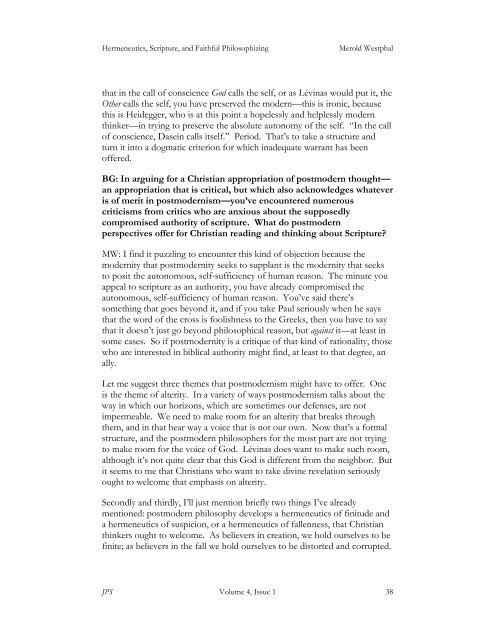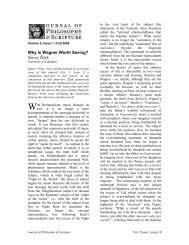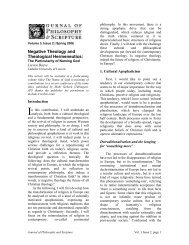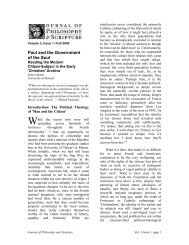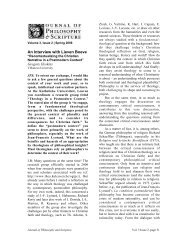interview with Merold Westphal - Journal of Philosophy and Scripture
interview with Merold Westphal - Journal of Philosophy and Scripture
interview with Merold Westphal - Journal of Philosophy and Scripture
You also want an ePaper? Increase the reach of your titles
YUMPU automatically turns print PDFs into web optimized ePapers that Google loves.
Hermeneutics, <strong>Scripture</strong>, <strong>and</strong> Faithful Philosophizing <strong>Merold</strong> <strong>Westphal</strong><br />
that in the call <strong>of</strong> conscience God calls the self, or as Lévinas would put it, the<br />
Other calls the self, you have preserved the modern—this is ironic, because<br />
this is Heidegger, who is at this point a hopelessly <strong>and</strong> helplessly modern<br />
thinker—in trying to preserve the absolute autonomy <strong>of</strong> the self. “In the call<br />
<strong>of</strong> conscience, Dasein calls itself.” Period. That’s to take a structure <strong>and</strong><br />
turn it into a dogmatic criterion for which inadequate warrant has been<br />
<strong>of</strong>fered.<br />
BG: In arguing for a Christian appropriation <strong>of</strong> postmodern thought—<br />
an appropriation that is critical, but which also acknowledges whatever<br />
is <strong>of</strong> merit in postmodernism—you’ve encountered numerous<br />
criticisms from critics who are anxious about the supposedly<br />
compromised authority <strong>of</strong> scripture. What do postmodern<br />
perspectives <strong>of</strong>fer for Christian reading <strong>and</strong> thinking about <strong>Scripture</strong>?<br />
MW: I find it puzzling to encounter this kind <strong>of</strong> objection because the<br />
modernity that postmodernity seeks to supplant is the modernity that seeks<br />
to posit the autonomous, self-sufficiency <strong>of</strong> human reason. The minute you<br />
appeal to scripture as an authority, you have already compromised the<br />
autonomous, self-sufficiency <strong>of</strong> human reason. You’ve said there’s<br />
something that goes beyond it, <strong>and</strong> if you take Paul seriously when he says<br />
that the word <strong>of</strong> the cross is foolishness to the Greeks, then you have to say<br />
that it doesn’t just go beyond philosophical reason, but against it—at least in<br />
some cases. So if postmodernity is a critique <strong>of</strong> that kind <strong>of</strong> rationality, those<br />
who are interested in biblical authority might find, at least to that degree, an<br />
ally.<br />
Let me suggest three themes that postmodernism might have to <strong>of</strong>fer. One<br />
is the theme <strong>of</strong> alterity. In a variety <strong>of</strong> ways postmodernism talks about the<br />
way in which our horizons, which are sometimes our defenses, are not<br />
impermeable. We need to make room for an alterity that breaks through<br />
them, <strong>and</strong> in that hear way a voice that is not our own. Now that’s a formal<br />
structure, <strong>and</strong> the postmodern philosophers for the most part are not trying<br />
to make room for the voice <strong>of</strong> God. Lévinas does want to make such room,<br />
although it’s not quite clear that this God is different from the neighbor. But<br />
it seems to me that Christians who want to take divine revelation seriously<br />
ought to welcome that emphasis on alterity.<br />
Secondly <strong>and</strong> thirdly, I’ll just mention briefly two things I’ve already<br />
mentioned: postmodern philosophy develops a hermeneutics <strong>of</strong> finitude <strong>and</strong><br />
a hermeneutics <strong>of</strong> suspicion, or a hermeneutics <strong>of</strong> fallenness, that Christian<br />
thinkers ought to welcome. As believers in creation, we hold ourselves to be<br />
finite; as believers in the fall we hold ourselves to be distorted <strong>and</strong> corrupted.<br />
JPS Volume 4, Issue 1 38


